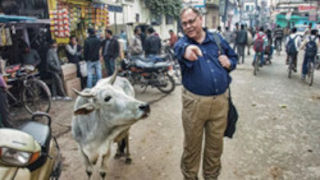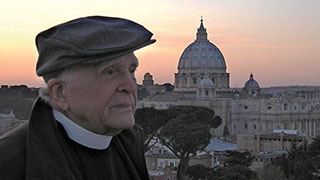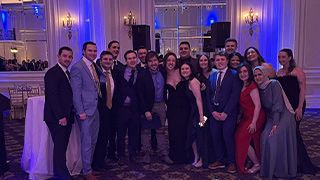Religious Tolerance in India Inter/Sections Podcast
Wednesday, November 10, 2021

Rabbi Alan Brill's book Rabbi on the Ganges engages in a study of Hindu-Jewish religious encounters.
On October 27, more than 3,000 attendees from around the world had the opportunity to learn about the Pew Research Center's survey on religious tolerance and segregation in India. Seton Hall University's Institute for Communication and Religion (ICR) collaborates with the Journal of Inter-religious Studies to produce its Inter/Sections podcast series on inter-faith dialogue and, for the first time, host Bernie Wagenblast '78 interviewed experts in a live simulcast format. Guest speaker Anway Mukhopadhyay of the Indian Institute of Technology in Kharagpur joined Rabbi Alan Brill, Seton Hall's Cooperman/Ross professor of Judeo-Christian Studies, to provide insight on how to interpret the survey results.
The Pew Research Center's groundbreaking survey was conducted from late 2019 to early 2020, featuring almost 30,000 interviews with adults in India done in 17 different languages. The survey addresses issues of religious tolerance, exploring the concept of respect for differing religious views and further working to define the differences and similarities in beliefs as communicated by the interviewees.
A.D. Amar, Ph.D. of the Stillman School of Business opened the podcast with welcoming remarks, summarizing the survey and its scope, as well as a few key findings. Wagenblast guided the conversation through questions of purpose, accuracy and dissemination of information, with insights on each topic shared by the experts in the field. Following this, Jon Radwan, Ph.D., director of the ICR, shared additional questions on behalf audience members. "If you read this report very closely will find that, of course, it can be appropriated from different internal perspectives. But actually, it's not something which can be pinned down from any single ideological perspective," stated Mukhopadhyay while addressing the reporting of the survey in Indian media. He added, "For instance, this report doesn't tell you that India is intolerant. It does talk about just certain cases of segregation, but at the same time it also tells you the paradoxes that constitute the Indian psyche."
One striking statistic was shared by Rabbi Brill, drawing from the Pew survey. "Ninety-seven percent of India believes in God. That is an incredible statistic, and 80 percent with certainty." To contextualize this for the American audience, he further stated, "In that sense, it doesn't correspond to anything we've got in Europe and America, because even in America, even if you are completely Seton Hall Catholic, that doesn't mean 80 percent of those who are Catholic have complete certainty of God, or the complete sense that you can assume that everyone believes in God on some level. [In India] we've only got a very small percentage that are not certain about God. There's such a deep, deep sense of the divine."
The interview was recorded and is available on the ICR news page and YouTube channel for viewing, as well as in podcast form as the third installment of the ICR's Inter/Sections Podcast. The discussion was also simulcast by Shemaroo, India's leading media distributor. The "Religion in India" podcast marks the ICR's third collaboration with Shemaroo, a partnership that continues to set Seton Hall records for international viewership.
About the Institute for Communication and Religion
Launched in Fall 2017, the Institute for Communication and Religion within the College of Communication and the Arts provides a nexus for ongoing scholarly exploration of communication topics critically important to religion and society. Guided by the spirit of ecumenical and interreligious cooperation, the Institute seeks to engage in public dialogue and debate, promote academic inquiry and support the religious dimension of creativity — all while upholding the values of servant leadership, curricular innovation and intellectual excellence. For more information on click here to visit the Institute for Communication and Religion.
Categories: Faith and Service





